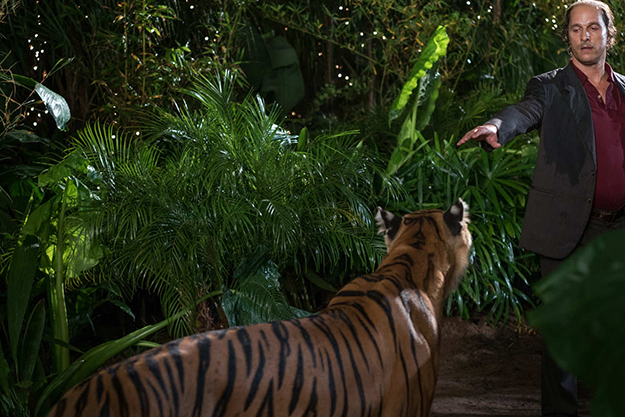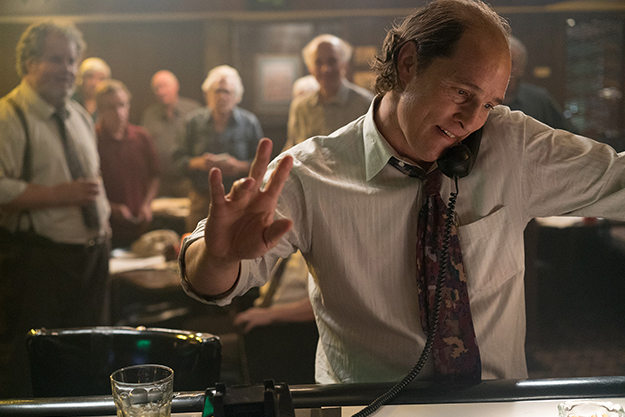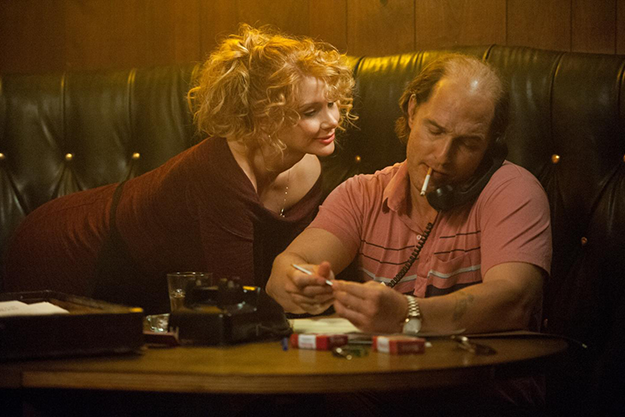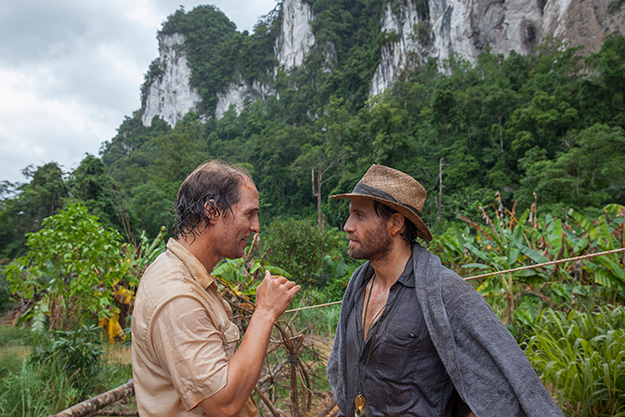Deep Focus: Gold

It’s too bad Stephen Gaghan’s Gold didn’t open, as originally scheduled, a month ago, because December 11 marked the tenth anniversary of a prize moment in pop culture: the night on Late Night With David Letterman when Matt Damon unleashed his killer impersonation of Matthew McConaughey advising a director, “Today’s scene would be a great opportunity for me to take my shirt off.” Yes, in those distant years before the McConaissance, when the star was cashing in on his early promise with romantic comedies like Fool’s Gold (no, Gold is not a prequel), both Damon’s spot-on mimicry and his use of “take my shirt off” as McConaughey’s signature threatened to turn the drawling star into a walking punch line.
What a difference a decade makes! After gaining a reputation as an actor’s actor with movies like Mud, Magic Mike, and Dallas Buyers Club, as well as True Detective on HBO, McConaughey tries to do the full De Niro in Gold, shedding his clothes not to reveal a chiseled physique but to expose the 47 pounds he packed on to play Kenny Wells, a desperate Reno mining-company executive. Wells follows an alcohol-fueled dream of striking gold all the way from Nevada to Indonesia, where he enlists the help of a smooth, cosmopolitan geologist named Mike Acosta (Edgar Ramirez), who says he can make it come true. McConaughey’s physique is suitably bloated, but so is his performance—and the movie.
Patrick Massett and Jason Zinman based their script very loosely on the story of the Bre-X mining site in Busang, Borneo that took off like a megarocket in 1993. If you don’t know anything about the resulting scandal, the twists and turns will hold your interest (no spoilers here), and, thanks to cinematographer Robert Elswit, there’s more than enough to look at. As the action hip-hops from Reno to Indonesia and then to New York, Elswit uses contrasting lighting, lenses, and digital and celluloid textures to convey the dizzying gaps between the deep, weathered grunge of the Reno bar where Wells and his longtime buddies do their business and the hallucinatory atmosphere of the jungle—and the even bigger gap between them and the sleek lairs of Wall Street wolves.

The film takes place in 1988, when commodities were in a bear market and Wall Street won Michael Douglas an Oscar for playing Gordon Gekko and declaring, “Greed, for lack of a better word, is good.” The screenwriters portray Wells as an honest-to-god Westerner wary of being pecked to death by the Gekkos he needs to finance his operations. His great-granddad crossed six states to settle in Nevada, and his granddad did well enough as a prospector for his dad (Craig T. Nelson) to expand his claims into a modern business named “Washoe Mining Corporation,” after Reno’s home county.
Near the end, when Wells accepts an award called the Golden Pickaxe for being the best miner of the year, he waxes poetical about what it means to be a prospector. After we’ve experienced the Indonesian wilds with him, we’ve got to wonder: is he delusional? Like his sane girlfriend Kay (a gritty, touching Bryce Dallas Howard), who works two jobs including barmaid to keep them afloat, we’ve seen him more like a pitchman at the end of his rope, banking everything on a fantasy of striking it rich in the jungle, and willing to do anything to prove his doubters wrong.
The narrative lurches from phone business conducted in a noisy Reno saloon to explorations and excavations in tropical undergrowth, and then on to corporate boardroom showdowns featuring the always-excellent Corey Stoll and Bill Camp as financial honchos so slick they almost seem wise. It even includes a Gatsby-esque party during which Wells strips down for a soak in the outdoor hot pool with a comely Wall Street associate (Rachael Taylor). The filmmakers rely on McConaughey to keep the film from flying off its mooring, but this kind of movie doesn’t need an anchor—it needs a sustained blast of inspiration. At first it’s fun to see a serious director like Gaghan strive to have a good time, but the only way he signals that his latest work is meant to be part epic and part absurdist romp is relying on exaggeration. Moments that should be seriocomic and transcendent turn into flat farce or limp soap opera.

I initially presumed McConaughey gained the weight at Gaghan’s request; after all, a dozen years ago George Clooney gained 30 pounds to play an out-of-favor CIA agent in Gaghan’s previous movie, Syriana. (I’d like to think Clooney won an Oscar not for the flab but for the heartbreaking doubt and hurt in his eyes as a father whose agency business has insulated him from his family.) But McConaughey said on Tuesday’s Jimmy Kimmel Show that putting on the weight was the natural outcome of his endeavor to live like his real-life counterpart, Calgary-based Bre-X CEO David Walsh. Except for the poor health and dietary habits, it’s hard to see how they’re alike. For one thing, Walsh was thoroughly Canadian and a former stockbroker, not a Western American go-getter like Wells. As Fortune journalist Richard Behar wrote in his 1997 eyewitness account, “Jungle Fever,” Walsh “was a miserable soul when we were introduced in his Jakarta suite, just hours after he swept it for electronic bugs. He was chain-smoking Dunhills and hacking his brains out. He hadn’t exercised in years, he said, which was apparent from a huge deposit hanging over his belt. He was depressed and distracted, and often stared out the window at the litter and sewage that flowed continuously down a muddy canal—a metaphor, we joked, for the corruption that thrived in Indonesia.” McConaughey’s Kenny Wells goes through dark passages, but right up to the bitter end he’s determined to be ebullient and to peddle dreams of extracting golden glory from the earth.
The different pieces of the star’s performance—and the movie’s game plan—don’t cohere. Members of the production have compared it to Arthur Miller’s Death of a Salesman, to David Mamet’s Glengarry Glen Ross, and to a couple of John Huston classics: The Treasure of the Sierra Madre and The Man Who Would Be King. (Before they were done they probably also had a look at The Wolf of Wall Street and possibly The Big Short, too.) In other words, the filmmakers want to create an indictment of greed, capitalism, and gold fever that’s also a rip-roaring adventure and a topical comedy. But to summon even the occasional “wow” or laugh, they reduce everything to the level of a reality-based tall tale. And to make sure audiences go home happy, they ultimately decide that the film is a buddy caper hinging on Wells’s friendship with Acosta. Ramirez gets points for his dapper under-playing, but Acosta’s character is too elusive and the surprise topper to their relationship and to the movie fizzles like a wet cap on a popgun.
Gaghan and company put McConaughey in the position of trying to make Wells contain everyone from Willy Loman, a salesman operating on “a smile and a shoeshine” (though his smile is forced and his shoes scuffed) to Huston’s roistering soldiers of fortune and colorful prospectors. McConaughey can’t do it; nobody could. Because McConaughey scales up his Wells’s back-slapping version of the hard sell, we think he must be going for satire. But he’s outsize in his earnestness and confusion, too. McConaughey does have one priceless comic moment: he assumes a proud yet idiotic smile when Acosta tells a bunch of moneymen that Wells nearly died in the rain forest. Unfortunately, the way Gaghan and the screenwriters have shaped the material, he’s supposed to be simultaneously funny, pathetic, and rousing, and McConaughey, in this movie, can’t do more than one at a time.

The movie as a whole is just as chaotic. Gaghan and company want us to take this tale of gold fever and market manipulations every which way, including loose. Each incident is so flimsy or jocular that nothing seems to be at stake; the final joke, which comes with a golden lining, makes the film end as if it were simply a giant shaggy-dog story. What’s startling from the director of the ultra-somber Syriana (2005) is Gold’s remarkable blitheness about the hardships of the Indonesian people. Criticism of President Suharto’s strong-man regime derives mostly from the ruler’s desire to horde mining profits for himself. (Wells, in his biggest triumph as a wheeler-dealer, strikes a deal with one of Suharto’s sons involving a totally made-up faceoff with the young man’s pet tiger.)
The filmmakers should have taken a closer look at this film’s stated predecessors. The Treasure of the Sierra Madre is a harrowing realistic fable about gold fever, greed, and the labor theory of value, while The Man Who Would Be King is a rousing adventure story parable about the hubris of colonialism. Both films are nimble and sophisticated about matters Gold shoves to the side, like the clash of Anglo and native cultures, and each has a galvanic core of feeling for nature and men’s lives. Huston enables us to “read” the action with exactly the right degree of irony as well as respond to it emotionally.
Gold lacks their authority, clarity, and entertainment value. Granted, Gaghan has a huge reputation as a screenwriter. He won an Oscar for mapping out the drug wars in the complicated script of Steven Soderbergh’s Traffic, and he was nominated for the nihilistic jigsaw puzzle that was Syriana, a portrait of the oil business as a political-industrial complex on the brink of self-destruction. But as a writer and a writer-director, he lets his work get plot-heavy, and here he fails to imbue Zinman and Massett’s script for Gold with an animating vision. The most eloquent shot is a nocturnal view of Acosta’s crews lighting up patches of the pitch-black jungle night.
Gaghan never catches you up in Wells’s gold-fever dream, so the movie, like his plan, falls apart. His attempt to impose a mock-heroic template on the material, doesn’t fit. The actual story reminded Fortune journalist Behar of a movie, but it wasn’t a Huston classic or anything resembling Mamet or Miller. As Behar put it, by the time the reporter got to Indonesia, he saw that Walsh was trapped in that “timeless movie farce in which Mickey Rooney, Milton Berle, and a slew of other characters try to out-sleaze one another in a manic race to recover buried treasure.” Yes, the actual story of Gold was like “a Javanese version of It’s a Mad, Mad, Mad, Mad World.”
Michael Sragow is a contributing editor to Film Comment and writes its Deep Focus column. He is a member of the National Society of Film Critics and the Los Angeles Film Critics Association. He also curates “The Moviegoer” at the Library of America website.







